CDC: Cardiac inflammation much possibly linked to mRNA COVID-19 vaccines
- Normal Liver Cells Found to Promote Cancer Metastasis to the Liver
- Nearly 80% Complete Remission: Breakthrough in ADC Anti-Tumor Treatment
- Vaccination Against Common Diseases May Prevent Dementia!
- New Alzheimer’s Disease (AD) Diagnosis and Staging Criteria
- Breakthrough in Alzheimer’s Disease: New Nasal Spray Halts Cognitive Decline by Targeting Toxic Protein
- Can the Tap Water at the Paris Olympics be Drunk Directly?
US CDC: Cardiac inflammation much possibly linked to mRNA COVID-19 vaccines
US CDC: Cardiac inflammation much possibly linked to mRNA COVID-19 vaccines. On June 23, 2021, the Centers for Disease Control and Prevention (CDC) specially convened the Advisory Committee on Immunization Practice (ACIP) to discuss the correlation between mRNA vaccination and cardiac inflammation.
This very important meeting has attracted much attention. After the conference report, almost all mainstream media in the United States made extensive and systematic interpretations.

(credit: Tami Chappell | Reuters)
First look at the main conclusion
The expert committee quoted the latest data and stated that after mRNA vaccination, there is a “likely association between mRNA COVID-19 vaccines and rare heart inflammation” in adolescents and young adults.
The expert committee also pointed out that the incidence is extremely low, and most patients recover quickly; and the benefits of vaccination far outweigh the possible harms, especially young people who have not been vaccinated recently become important infections of mutant strains of the new coronavirus. crowd.
Go deeper into the details
1. Likely association, how likely is it to be related?
According to the IPCC rules, Likely means that the probability is greater than 66% and less than 90%, which is similar to “probably” or “highly possible” in the Chinese context.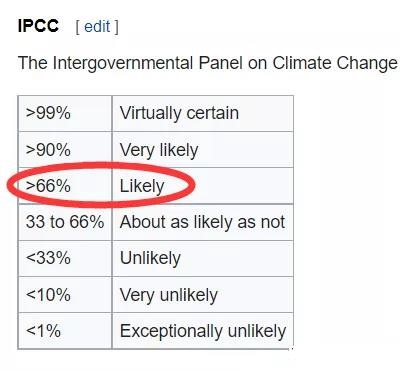
2. The composition of the expert committee and data sources
The immunization practice advisory committee composed of pediatric doctors, infectious doctors, and other medical experts besides the CDC reviewed the report submitted by the CDC.
In the CDC report, the US Federal Security Database has reported about 1,200 cases of myocarditis and pericarditis after mRNA vaccination.
3. Use data to tell stories

The following data are from this report. The copyright belongs to CDC and ACIP.
It should be noted that myocarditis/pericarditis after vaccination is different from vaccination-associated myocarditis/pericarditis. Because under normal circumstances, myocarditis/pericarditis will occur if vaccinated or not. These cases are called “expected cases”; however, cases related to vaccination should not have occurred, but they occurred due to vaccination induction.
However, in clinical work, it is currently impossible to distinguish between the two; therefore, the following analysis includes all post-vaccination myocarditis/pericarditis.
1) the characteristics of patients with cardiomyopathy/pericarditis after mRNA COVID-19 vaccination
A total of 1226 cases have been reported.
- 267 cases of myocarditis/pericarditis were reported after the first dose of vaccination, 827 cases were reported after the second dose of vaccination, and 132 cases were unknown.
- The average age is 30 years old (after the first dose) and 24 years old (after the second dose);
- Myocarditis/pericarditis occurred in 4 days (first dose) and 3 days (second dose) after vaccination;
- The proportion of males was 66% (after the first dose) and 79% (after the second dose).
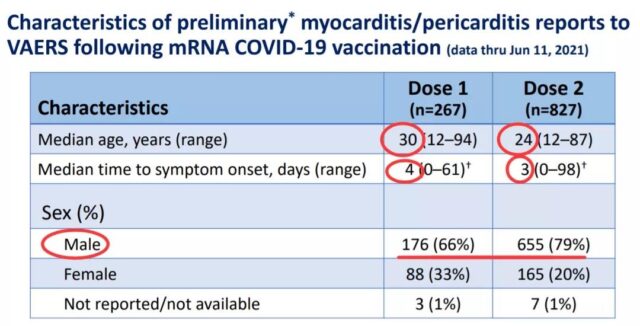
A, age distribution
details as follows. Blue is after the first dose of inoculation, and red is after the second dose of inoculation.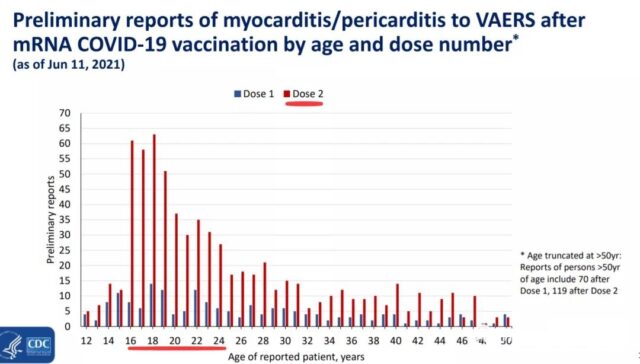
B, the time of occurrence respectively.
details as follows. Blue is after the first dose of inoculation, and red is after the second dose of inoculation.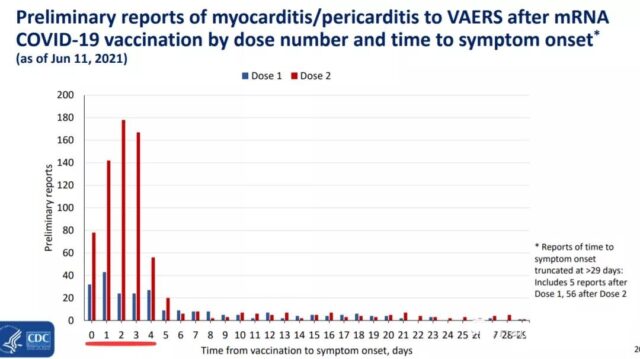
2) Symptoms of myocarditis/pericarditis after vaccination.
The clinical symptoms are mainly chest pain and dyspnea. Auxiliary examinations show changes in st-t wave, increased kinase and changes in cardiac ultrasound imaging.
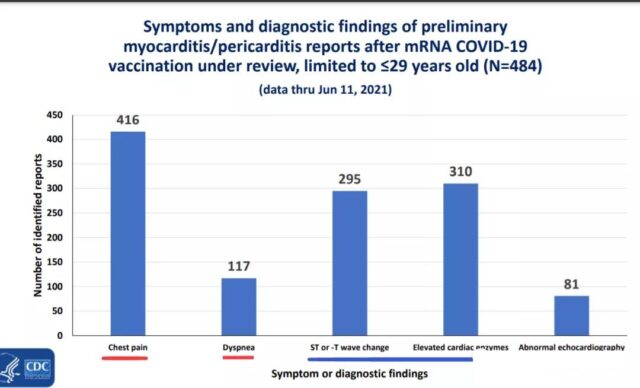
3) Myocarditis/pericarditis in adolescents and young adults
Among the reported cases, 484 were 29 years old or younger, and 323 of them met the CDC diagnostic criteria.
Of these cases, 218 (79%) recovered; 9 were still hospitalized, of which two were in ICU.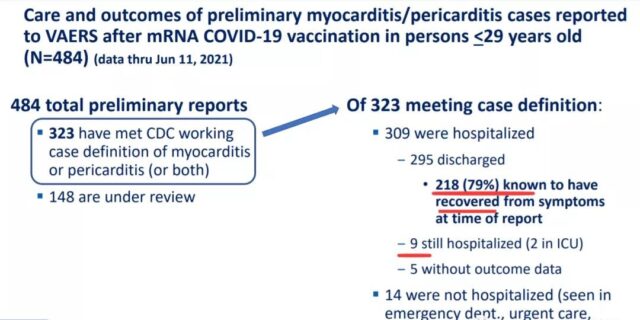
4) The correlation between myocarditis/pericarditis in adolescents and young adults and the first dose of mRNA vaccination.
It can be seen that the number of myocarditis/pericarditis in men aged 12-24 years is significantly higher than the expected number of cases within 21 days after vaccination.
The number of myocarditis/pericarditis in men aged 12-29 years was significantly higher than the expected number of cases within 7 days after vaccination.
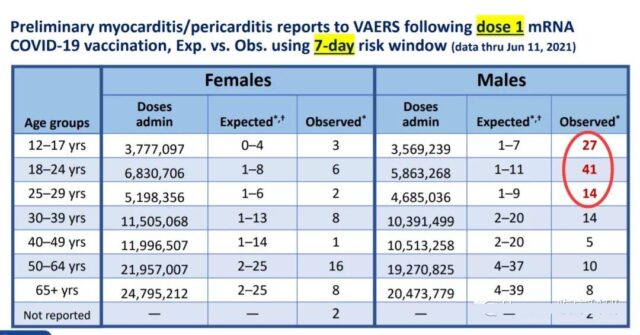
5) The correlation between myocarditis/pericarditis in adolescents and young adults and the second dose of mRNA vaccination.
It can be seen that the number of myocarditis/pericarditis in women aged 12-24 and men aged 12-39 within 21 days after vaccination was significantly higher than the expected number of cases. Among them, the 12-24 year-old age group is more than 10 times the expected number of cases.
The number of myocarditis/pericarditis in 12-29-year-old women and 12-49-year-old men within 7 days after vaccination was significantly higher than the expected number of cases; among them, the 12-24-year-old age group was 50-100 times the expected number of cases.

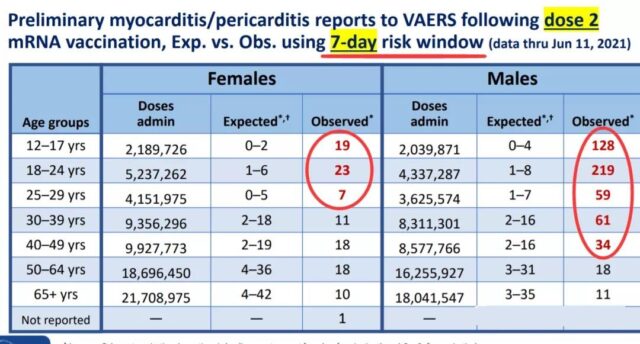
6) The probability of occurrence
Among men aged 12-17, for every 1 million second doses of vaccine, an average of 66.7 cases of myocarditis/pericarditis occurred. The longer the age, the lower the chance.
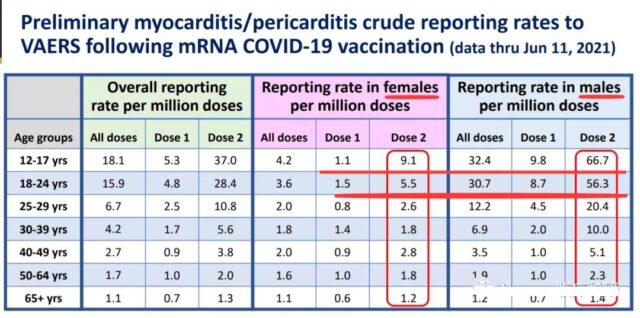
7) In the age group of 12-39, the risk ratio of myocarditis/pericarditis 7 days after vaccination is 10.8.
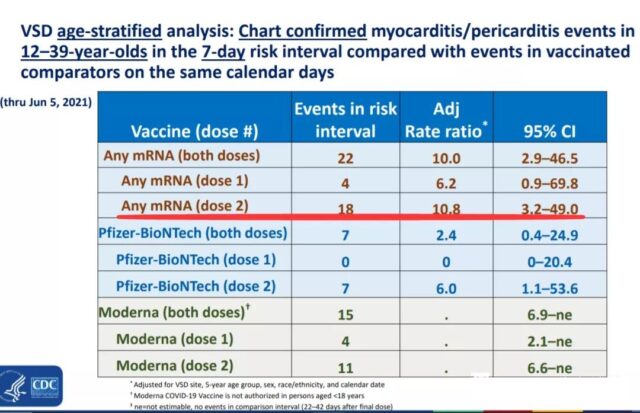
8) The incidence.
In the age group of 12-39, myocarditis/pericarditis occurred on the 21st day after the second vaccination per million doses, with an average of 12.6 cases of myocarditis/pericarditis.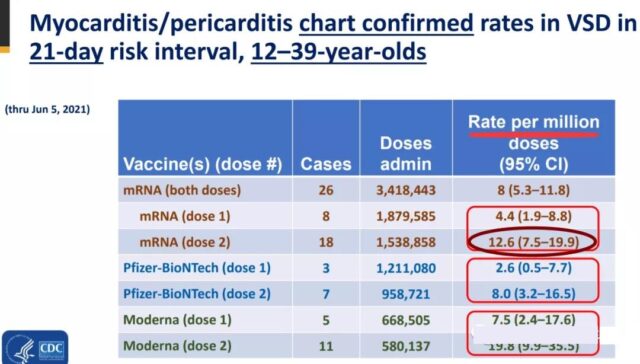
The conclusion of CDC/ACIP:
1. Myocarditis/pericarditis after mRNA vaccination mainly occurs in young people and men, more than within 4 days after the second dose.
2. 21 days after the second vaccination per million doses, an average of 12.6 cases of myocarditis/pericarditis occurred.
3. The vast majority of patients recover.
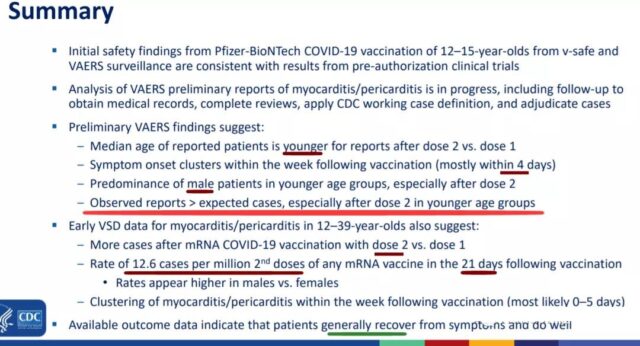
After the meeting, the US CDC, the Department of Health and Human Services (HHS, equivalent to China’s Health Commission) and 15 other public health organizations issued a joint statement:
“The facts are clear: This is an extremely rare side effect, and only an exceedingly small number of people will experience it after vaccination,”
“Importantly, for the young people who do, most cases are mild, and recover individuals often on their own or with minimal treatment. In addition, we know that myocarditis and pericarditis are much more common if you get COVID-19, and the risks to the heart from COVID-19 infection can be more severe. The vaccines are safe and effective, and they prevent COVID-19 illness. They will help protect you and your family and keep your community safe. We strongly encourage everyone age 12 and older who are eligible to receive the vaccine under emergency use authorization to get vaccinated, as the benefits of vaccination far outweigh any harm.”
Further processing
In response to the risks disclosed by the CDC, an official from the US Food and Drug Administration (FDA) said that the agency will add warnings about the risks to the labels of mRNA vaccines produced by Pfizer and Moderna.
Expert Comments:
We have been following the progress of heart inflammation after mRNA vaccination from the very beginning, especially the results of today’s meeting. The main results of this meeting are summarized as follows:
1. Very likely association.
After mRNA vaccination, rare heart inflammation in adolescents and young adults is “probably related” to vaccination; (ACIP conclusion)
2. Cardiac inflammation after mRNA vaccination is still an extremely rare side effect.
For boys aged 12-17, for every 1 million second doses of vaccine, 56-69 cases of myocarditis may occur; (CDC Epidemiology Information Service Officer, Dr. Megan Wallace);
But at the same time, for boys of this age, vaccination can prevent 5,700 COVID-19 cases, and further avoid 215 hospitalizations, 71 admissions to intensive care units and 2 deaths.
3. The symptoms of vaccine-related cardiac inflammation are mild.
Among the 323 cases reviewed that meet the definition of cardiomyopathy or pericarditis, 309 need to be hospitalized, and 295 of them have been discharged; (CDC report)
4. Risk notification.
COVID-19 pneumonia in adolescents and young people cannot be ignored
Since the outbreak of COVID-19, 2,767 teenagers and young people aged 12-29 have died of COVID-19 in the United States; since April 1 alone, 316 people in this age group have died of illness. In May 2021, young people accounted for 33% of all cases in the United States.
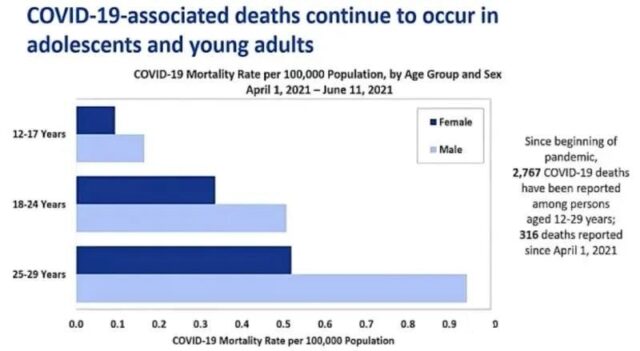
(Picture source: US CDC)
All of this means that it is urgent for young people to receive the COVID-19 vaccine.
Regarding vaccine-related heart inflammation, A series of problems that are far from being solved
To be honest, the only outcome of this meeting is that the relevant practicing physicians can calmly explain the problem to the teenagers and their parents:
- mRNA vaccination is associated with myocarditis/pericarditis;
- But the probability is extremely low and the symptoms are mild; moreover, the benefit of vaccination is still much higher than that of no vaccination.
But in fact, as parents of children, we are more concerned about: Is there a better vaccination strategy or other alternative vaccines?
There was no answer at this meeting.
Revisiting the clinical recommendations issued by the US CDC
On May 28, 2021, the Centers for Disease Control and Prevention (CDC) published on its official website the clinical recommendations for post-mRNA vaccination myocarditis and the temporary recommendations of the Immunization Practice Advisory Committee.
- In view of the greater risk of serious complications related to COVID-19, including hospitalization, multiple system inflammatory syndrome in children, or death from illness, the CDC recommends that all people over the age of 12 be vaccinated against COVID-19.
- Clinicians need to report post-vaccination side effects including myocarditis/pericarditis through the VAERS system.
- Adolescents or young adults should consider myocarditis or pericarditis when they have acute chest pain, shortness of breath, or palpitations. At this age, coronary events are unlikely to be the source of these symptoms.
If the clinician finds these symptoms, be sure to ask about the previous history of COVID-19 vaccination. - For preliminary evaluation, ECG, troponin levels, and inflammatory markers (such as C-reactive protein, erythrocyte sedimentation rate) can be considered. If all three are normal, the possibility of myocarditis or pericarditis is extremely low.
For suspected cases, consider consulting a cardiology specialist evaluation, which may be based on the patient’s age, clinical characteristics, underlying cause, or specialty. - It is important to rule out other underlying causes of myocarditis and pericarditis. Consider consulting an infectious disease and/or rheumatologist to assist in the evaluation.
We have been chasing feedback from well-known virologists and pediatricians, as well as the experience of Israel and other countries. In general, the possible measures that vaccinators and their parents may use include:
1. For adolescents who have received mRNA vaccine, even if they have only received one dose, they should be closely observed after vaccination, especially if they feel unwell, see a doctor in time for symptoms such as chest pain, shortness of breath, and palpitations. And explain the vaccination history to the doctor.
2. Virologist Monica Gandhi summarized possible vaccination strategies,
1) If your child has been infected with the new coronavirus or has antibodies, you can reconsider whether to vaccinate;
2) Considering Israel’s vaccination strategy, only one dose of mRNA vaccine will be given temporarily;
3) Consider vaccinating adolescents with lower doses;
4) Delay the time of the second dose of vaccination;
5) Young men can consider vaccinating Johnson & Johnson (in fact, we are looking forward to Novavax’s protein vaccine).
Again, the above suggestions are only academic suggestions from scientists, and cannot yet constitute clinical practice guidance; therefore, we will continue to pay close attention to the latest updates of the CDC.
US CDC: Cardiac inflammation much possibly linked to mRNA COVID-19 vaccines
(source:internet, reference only)
Disclaimer of medicaltrend.org
Important Note: The information provided is for informational purposes only and should not be considered as medical advice.



